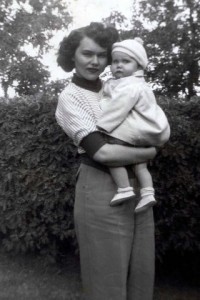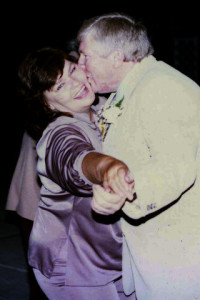(re)Collection
I have my grandmother’s cats. There are two of them, ceramic, shiny. I can’t remember them clearly; one is more pinkish, the other more purple or more blue. I think the pinkish one is sitting up, while the other is laying down. They are patchwork, but I couldn’t tell you a single detail of a single patch. I can tell you that they are currently sitting in the bedroom that used to be my room, on top of the wooden chest my mom bought me, and are among a handful of items of my grandmother’s scattered about the house. Her vanity. A lamp (I think). Several vases. And actually and properly hung up on the wall, oil paintings of roses she painted herself.
My memories of my grandmother are always of seeing her in her space, surrounded by these decorative items she collected, many of them gifts from her children and grandchildren. She and my grandfather lived in many houses, but every home had the same overall feel as the last, thanks to the furniture and items they took with them, thanks to Nanny’s display case, her tea pots, her porcelain flowers, her vases, her cats, her treasures. It was in her last home, the first she and my grandfather owned and which my aunts and uncles helped her paint and decorate, that I have the strongest memories of her. This was after my grandfather had died, after my brother had died, when I would go up to visit friends and family in a state I no longer lived in and stay with my grandmother, and we would sit in her living room among all her items and talk.
Most every other memory I have of my grandmother was through the lens of my mother. I heard more stories about her than from her. I heard about how complicated my mother’s relationship was with her. I heard about all the hurts and slights. I heard about the harshness in my mother’s reported childhood, the not-so-secret secrets, the dramas and hysterics and proof that my mother had it harder than me.
Those visits are the only memories I have of just my grandmother and me together.
Nanny told me about the loss of her own brother, when he was only 31. She would listen to me talk about mine, and add her own insights into how she saw her grandson. We would talk about the grieving process together, about the loss of her husband, about the loss of her grandson, about how much she missed having peers, people her age, to talk to.
Her hands would never sit idle, always playing with something, twisting something, tearing some piece of paper or cardboard into tiny confetti that she would later scoop up and throw away. My hands are her hands, always seeking something out to twist and twirl and fold and tear.
It’s not that I didn’t think that someday I would have in my possession things that belonged to my grandmother. I knew I would. This is the order of inheritance, of heirloom, of items passed down from generation to generation with the value of each item in the hands that held them before.
My grandmother passed away in March of 2006. And for the next 7 years, items that were hers were my mother’s. And then in March of 2013, they became mine.
My grandmother and I talked about my mother. My mother hated secrets, and wanted to know everything about everyone she cared about, and it was this insistence of knowing that most put her at odds with my grandmother in their later years together, because my grandmother was good at keeping secrets. Her rule with me (and with many family members) was that I could tell her anything — and she wouldn’t share what I said with anyone else. I know she didn’t share with my mother, because we both knew that what we talked about would be too hard for my mother to hear.
We talked about how difficult and stubborn my mother was. We talked about how her grief was not like anyone else’s we knew. We talked about how hard it was for me to make my own space — in grieving my brother, in living my life, in holding the line between my mother and me — because my mom took up so much room. Nestled in among the soft pastels and muted jewel tones of my grandmother’s home, the sun going down without either of us getting up to turn on the lights, we shared the secret that my mother drove us both crazy, and that we loved her nonetheless.
We had two perspectives on the same person, the one who raised her and the one raised by her, and yet our conclusions were often much the same. I took great comfort that I was not imagining the things I saw in my mother, that I was not just an ungrateful daughter who couldn’t find a way to make my mother my priority in life. I told Nanny things I didn’t dare tell anyone else, and she nodded, understanding, telling me it was okay, that I was okay, that I would keep being okay.
Visiting with my grandmother was easy. She was not a demanding host, and always insisted that I not alter my plans to accommodate her. I’d take her to the store, if she’d let me, or at least go to the store for her and always be sure to remember to bring her back something sweet. She let me sleep in in the mornings, shooing her dog away from the guest bedroom door so as not to disturb me. She let me come and go as I pleased. She made no demands. Her door was always open.
The room I slept in used to be hers; in their later years, she and my grandfather each had their own bedroom, and after he passed (and with help from my aunts) she redecorated and moved into his, turning her old one into the guest bedroom. I slept near the vanity that would someday find a spot in my old bedroom in my mother’s house. Every room of my grandmother’s home was decorated with various tchotskies so that the eye always had something interesting to rest on, some small treasure to find. (My mom would decorate her home with the same philosophy, if different color palette.) Nanny’s garden was much the same way, with surprises nestled in the wild-flowers and bushes to always give a visitor a sense of wonder.
Conversation with my grandmother was like taking a tour of her home; talks were peppered with jewels of information and insight, and any twist in the conversation could lead to a story I’d never heard told before, or never heard her tell in quite the same way. But the stories were so quiet and the insights so subtle that like the patchwork ceramic cats that were always on a side-table, I overlooked them. I remember the feel of our conversations better than the actual details.
I mourn the stories she told, and would still be telling. I wish I had written them down, recorded them, found some way of preserving them. I remember my grandmother much the same way I remember those cats that are in a home 3,000 miles away from me: as a vague shape, a tinge of color, a feeling. She is a conversation at twilight, a bit of torn up paper, a collection of pretties.
I wish I knew her better.
*This post originally was published on another personal blog I no longer keep up.



